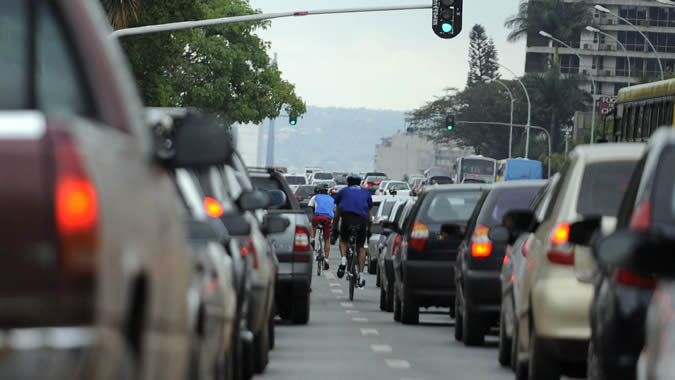Latin America and the Caribbean Maintains a High Traffic Accident Mortality Rate
Work area(s)
ECLAC and PAHO will analyze road safety progress and challenges during a global conference that will be held in Brasilia on November 18-19.

Latin American and Caribbean progress on reducing road traffic accident fatalities has been slower than expected, and therefore the region should redouble its efforts to achieve the goal of halving the number of deaths stemming from these tragedies by 2020, as established by the United Nations, ECLAC said in a recently published report.
According to the FAL Bulletin N⁰ 342 of the Economic Commission for Latin America and the Caribbean (ECLAC), prepared in conjunction with the 2nd Global High-Level Conference on Road Safety that will be held in Brasilia on November 18-19, the rate of fatalities from road tragedies in the region grew 20% in the first decade of the current century, rising to 17.68 deaths per 100,000 inhabitants in 2010 from 14.75 deaths in the year 2000.
These figures did not improve significantly in the first years of the Decade of Action for Road Safety 2011-2020, considering that according to recent statistics delivered by the World Health Organization (WHO), the road traffic fatality rate in Latin America and the Caribbean reached 15.9 deaths per 100,000 inhabitants in 2013, lower than the 16.1 deaths registered in 2010 but still far from the expected 50% reduction by the end of the decade, which is in line with the sixth target of Goal 3 of the new Sustainable Development Goals.
To address this matter, ECLAC and the Pan American Health Organization (PAHO) will hold on November 19 in Brasilia a regional meeting on the occasion of the 2nd Global Conference, in which the current situation of Latin America and the Caribbean will be analyzed.
According to the global Plan of Action for the decade, five pillars were established that aim to promote the development and coordination of actions to reduce road accident mortality in local, national and global arenas. ECLAC’s study analyzes Latin America and the Caribbean’s performance on these five pillars during the first years of the decade of action and presents the region’s pending challenges in terms of road safety.
The five pillars are related to road safety management, road infrastructure and broader transport networks, safer vehicles, road users and post-crash response.
According to ECLAC’s report, only 57% of the region’s countries have defined goals for the reduction of fatalities in road traffic accidents, while all developed countries present clear goals, whether they are national or provincial.
In the region, the countries with the most ambitious goals (a 50% reduction contemplated in their national plans) are Argentina, Colombia, El Salvador, Mexico, Uruguay and Suriname.
According to ECLAC, road safety must be part of an integrated mobility policy that combines short, medium and long term actions in areas such as road infrastructure, the design and condition of vehicles, the behavior of transportation users, education, the health system and the audit and oversight of measures.
Related content

Country(ies)
Contact
Public Information Unit
- prensa@cepal.org
- (56 2) 2210 2040